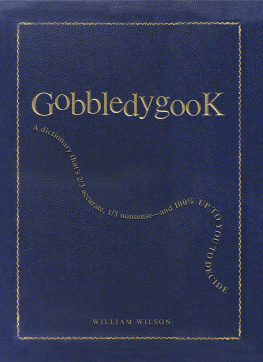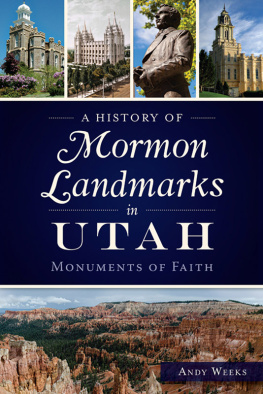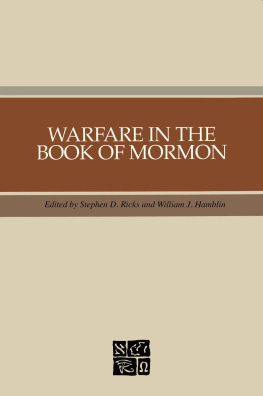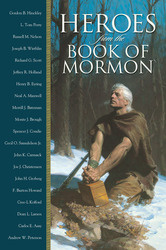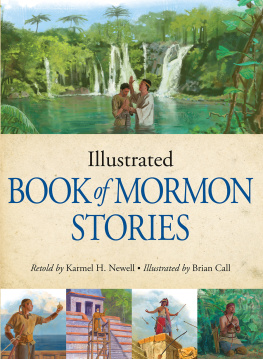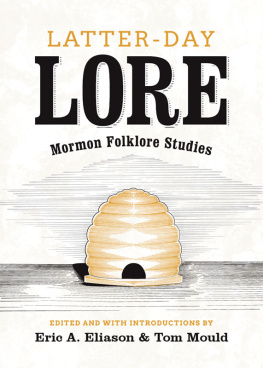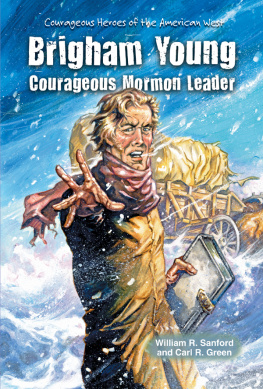ON BEING HUMAN
The Folklore of Mormon Missionaries
Only a week before I received the invitation to write this introduction, two faculty members who are team-teaching an introductory class about world arts and cultures queried me. Their course concerns concepts and perspectives in the intercultural, interdisciplinary study of art, aesthetics, and performance. Among other matters, it examines the performative representation of cultural identity. The instructors sought articles outside their own fields that students should read. Immediately I recommended William A. (Bert) Wilsons On Being Human: The Folklore of Mormon Missionaries. It deals as much with behavior, performance, and culture as it does with the lore of a particular religious identity. The piece is imminently readable; Bert is a marvelous storyteller and a fine writer. Based on a huge quantity of recorded data, personal experience, and years of reflection, this essay contains numerous insights about the nature of narrating and its impact on peoples emotions, behavior, and interactions.
I met Bert Wilson at Indiana University. He was completing his graduate studies in the Folklore Department as I was beginning mine. His book Folklore and Nationalism in Modern Finland (1976a), which grew out of his dissertation, remains the best study of the use of folklore in nationalistic movements. When we first met we talked about his interest in Mormon folklore. He was dissatisfied with earlier works. Either the publications consisted largely of documentation without analysis or, written by outsiders, the interpretations were inadequate and inappropriate. As a practicing Mormon, Bert has an emic or insider view of the traditions. He was a missionary to Finland. He has participated in some of the lore that he reports and analyzes in his publications.
Two major streams of scholarship appear to have influenced Berts interpretation of the traditions presented here. One is a behavioral perspective, which embraces a performance studies approach. When he writes about stories being framed with beginning and closing markers and with a stylized manner of performance (including gestures, rhythmical speech, shifts in intonation, and ceremonial language), he draws upon ideas propounded by Roger Abrahams, Richard Bauman, and others who (like Bert himself) contributed to the analysis of verbal art as performance. When he dwells on the telling of a story during which the narrator and listener together shape the form and meaning, and on the unique circumstances in which the narrating occurs, he relies largely on the work of Robert A. Georges, who helped develop a behavioral orientation in folkloristics. This perspective eschews the study of texts in favor of concentrating on communication and social experience in the context of specific events. A result is the greater understanding of expressive behavior as, in Berts words, an artful rendering of significant human experience. This is particularly apparent in Berts moving examination of his mothers narrating, which he writes about in Personal Narratives: The Family Novel, included at the conclusion of this volume.
__________________________
This paper was delivered as the 64th Annual Faculty Honor Lecture in Humanities at Utah State University on November 18, 1981. It appeared the same year in a lecture series booklet published in Logan, Utah, by Utah State University Press. Reprinted by permission of Utah State University Press.
Functionalism, too, inspired the present article. This can be seen in the latter part that analyzes four sociocultural and psychological consequences of the lore of Mormon missionaries. In addition to its obvious entertainment value, Bert writes, the lore functions to create a sense of group solidarity, let off steam as a form of coping and silent rebellion, promote conformity to accepted standards of conduct, and develop an image of a world in which the missionaries may succeed (eventually emerging as victorious). William R. Bascom discusses several of these in Four Functions of Folklore (1954). He contends that folklore enables people to escape in fantasy from repressions imposed upon them by society, validates culture by justifying its rituals and institutions, inculcates behavioral norms, and applies social pressure in order to maintain conformity to accepted patterns of behavior. A paradox arises according to Bascom: while folklore appears to play a vital role in transmitting and maintaining a cultures institutions and enforcing individual conformity to behavioral norms, at the same time it provides socially approved outlets (wishful thinking, letting off steam) for the repressions imposed by the institutions. Bert examines this paradox more fully in an essay titled The Paradox of Mormon Folklore (1976c).
All of us are influenced by the writings of others. When I penned the introductory essay in a volume that I edited on the Finnish national epic, I drew heavily upon Bert Wilsons book about folklore and nationalism in Finland (see Jones 1987b). His articles on Mormon traditions evince the intellectual rigor possessed by his study of Finnish nationalism. Each is well written and insightful; all stand as the best that has been published on the subject.
Two other matters should be mentioned. The concept of folk group has often been bandied about since Alan Dundes proposed it in the mid-1960s (based on the notion of a folk as opposed to the folk articulated by Richard M. Dorson in Bloodstoppers and Bearwalkers ([1952] 1972). Bert Wilson, in the present essay, is one of the few scholars to have ever pointed out some of the concepts flaws (for yet others, see Blumenreich 1974).
Second, Bert Wilson is both a devout Mormon and a folklorist specializing in the traditions of Mormons. While his insider status yields important ethnographic insights, it poses challenges. As Bert indicates, the concept of the folk is outmoded in folkloristics (although it is still used by some scholars in other fields). To speak of Mormonism as folk religion, which some in the past have done, is both inaccurate and offensive. Bert had to clarify for himself the difference between official church teachings and what could be identified as folklore, that is, traditions learned informally and engaged in by people in firsthand interaction. When he addresses an audience of Mormons, he takes care to differentiate between the two. This need is even greater when he speaks or writes to non-Mormons lest they view adherents to this religion as somehow strange, and as different from themselves. As Bert makes apparent in his writings, it is the ability and propensity of all of us to describe something that happened (to tell a story), to ritualize, and to experience the sacred in our everyday lives that makes us human, that is, members of a common species regardless of other identities that we might assume or be ascribed. In engaging in folklore, Mormons express their humanityjust as the rest of us do.
Michael Owen Jones
NOT LONG AGO, I WAS ASKED TO ENTERTAIN SOME OF MY COLLEAGUES AT A faculty gathering by telling stories about J. Golden Kimball, that crusty old Mormon divine who salted his sermons and public statements with a liberal sprinkling of cuss words and earthy metaphors. Because I know a fair number of these stories and enjoy telling them, I agreed. The event was a tolerable success. At least most people laughed, and no one threw brickbats. Still, as I drove home, I wondered if I had not done more harm than good. I had, I feared, simply strengthened the notion, held by many, that the study of folklore might provide interesting material for after dinner speeches but certainly could not be expected to increase our understanding of the human condition.


